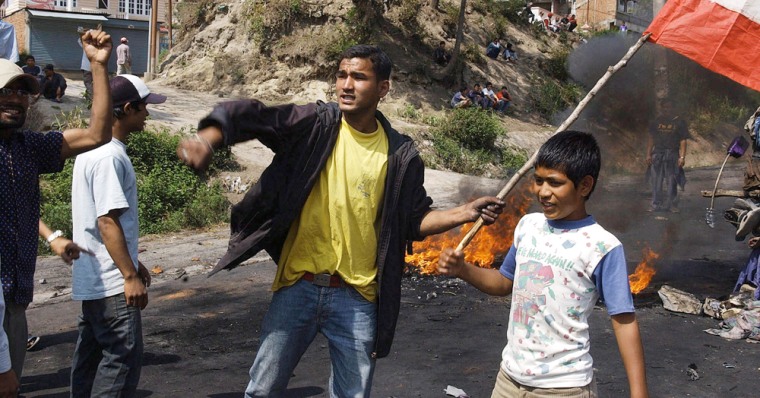Tens of thousands of people celebrated in the streets Tuesday and weeks of pro-democracy protests were called off after the king gave in to a key demand to reinstate parliament.
But communist insurgents who had supported the protesters rejected the king’s offer, a sign that the turmoil in this Himalayan country is not over.
King Gyanendra’s concession Monday night handed power back to elected politicians and cleared the way for the creation of a new constitution that could leave him largely powerless, or even eliminate the monarchy.
Across the capital, people streamed into the streets, singing and clapping.
“We have forced the king to his knees,” said Rajan Sreshta, an opposition activist. “It shows the people are the actual power.”
By Tuesday morning, life was almost back to normal in Katmandu, where the crisis had alternately filled streets with protesters and emptied them because of curfews.
Stores opened their doors, volunteers cleared blockades from roads and mobile phones were back on after being switched off by the government in an attempt to disrupt protest organizers.
“People Power Wins” the Kathmandu Post, an English-language newspaper, blared in enormous letters at the top of its Tuesday edition.
Protestors skeptical
Demonstrators celebrating in a park in the center of the capital said they were thrilled by the return of parliament, but some remained skeptical of their political leaders, few of whom have much popularity outside their own parties.
“Nepal is free again, and we’re here to make sure it will remain free forever,” said demonstrator Sunita Maharjan.
The opposition alliance will now “bear the responsibility of taking the nation on the path of national unity and prosperity,” Gyanendra said in his address, broadcast on state television and radio.
The announcement was dismissed by the Maoist insurgents as “a conspiracy to protect the regime,” according to a statement signed by rebel leader Prachanda and his deputy Baburam Bhattarai.
They warned that the seven-party opposition alliance had betrayed the Maoists by welcoming the announcement and vowed to press ahead with blockades that have sealed off major roads in the country for weeks, leading to serious shortages of food and fuel in Katmandu.
Alliance officials had said earlier that they wanted to pull the Maoists into the political mainstream, and planned to declare a cease-fire with them once a new government was formed.
“We will work together with the Maoists,” Krishna Sitaula, a top Nepali Congress official and alliance spokesman, said after emerging from closed-door discussions among party leaders.
Incoming PM considered a hero
The king’s announcement, which came near midnight Monday, was a pivotal concession after weeks of mass protests had threatened to force him from power. The protests sparked clashes with security forces that left 14 demonstrators dead and the country dangerously volatile.
The opposition leaders said they wanted former Prime Minister Girija Prasad Koirala, head of the Nepali Congress party, to lead the new government. The alliance also formally called off the protests and general strike that had nearly paralyzed life in Nepal for weeks.
Koirala, 84, has been a politician for decades, a prime minister four times and is the head of the country’s largest political party. He has been a hero of the democratic movement — spending seven years in prison in the 1960s for fighting for democratic rule — as well as a symbol of the tiny political class that took hold of Nepal after 1990 and left many people here badly disillusioned with their politicians.
He made no immediate comment.
For much of the crisis, Gyanendra had remained silent behind the walls of his heavily guarded palace in central Katmandu, kept in power because of the loyalty of his army and police.
He dismissed an interim government 14 months ago and seized power, saying he needed to bring order to the country’s chaotic politics and to crush the Maoists.
Reinstating parliament’s lower house was a key alliance demand.
The lower house was to create an interim government under the alliance’s plan, which would then set up special elections for an assembly. That assembly, in turn, would write a new constitution. The lower house holds real elected power in Nepal’s constitution.
The constitution will almost certainly bring dramatic political changes. Most opposition leaders favor a constitution that would give Nepal a ceremonial monarchy, or simply eliminate it completely.
